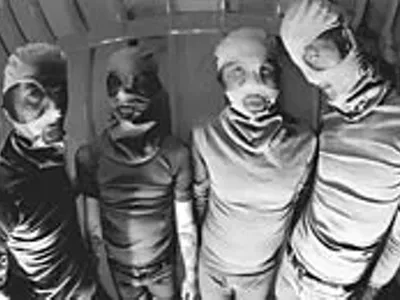Jamar “Cash Kola” Evelyn’s River Place apartment is typical. It would win an award for presentation in any bachelor pad competition.
Inside the two-bedroom digs there’s a wraparound couch, a single three-headed lamp, a 50-inch television and a Sony PlayStation 2. There are no paintings or plants, but there is a Big Lots-caliber dining room table with four modest chairs that Kola warns may break if I sit in them.
Twenty-year-old Kola fits the stereotype of the contemporary thug emcee. And the pad is simply a place for him to rest his head. He spends most of his time on the road promoting his star-studded debut album, Life in General, which has been holding steady in the lower-to-mid reaches of Billboard’s R&B/Hip-Hop charts since last fall.
As rappers go, Kola sticks to the typical dress code; brown Timberland boots and baggy State Property jeans, a black long-sleeve T-shirt with a custom abstract painting on the chest, three white gold chains, each with its own dangling medallion, and a baseball cap. In person, he’s accommodating and friendly.
He asks if I mind his smoking while we talk. I say no, and he proceeds to roll a joint thick enough to write “Free Tommy Chong” on its side.
He sparks the spliff. He inhales. He starts talking and things ain’t so typical anymore.
“I used to terrorize this whole hood,” he says, exhaling. “All my teachers knew, from fifth grade up, I used to carry a gun to school.”
Kola was raised and his three younger siblings were raised by their mother. By age 12, he was involved in drugs, gun dealing and a clothes-boosting ring. He served in three of Michigan’s most notorious juvenile detention facilities. He says flagitious behavior runs in his family. An uncle was killed during the height of the 1980s drug wars between Detroit’s infamous Chambers, Curry and Brown families.
“I was locked up for a lot of my life,” Kola says. “I spent most of my childhood locked up, trying to find my right path. I did my sweet 16 in jail, and I turned grown in jail.”
Kola was born in Detroit and lived in a neighborhood around Warren, Sheridan and Bewick. The neighborhood — once a destination for Southern migrants who came to Detroit to find work in the automotive industry — was crippled by the crack cocaine epidemic that hit Detroit in the ’80s.
When the drug war claimed his uncle, the family sent Kola to live with another uncle in New York City. He was 8 years old then and already indoctrinated into street life. He’d also begun rapping, getting into people like Spice 1, MC Eiht and Celly Cel.
By age 9, Kola says his New York uncle put him out on the streets. “I went to the store, came back, and he wouldn’t let me in — just slid a .25 [caliber pistol] under the door.”
Kola then found refuge with a neighbor and soon returned to Detroit. Back home, he promptly started his own hustle. Guns and clothing scams became his racket.
Working with partners several years older, none of whom he will name, Kola “boosted” clothes from department stores in Cincinnati — Lazarus, Dillard’s, Marshall Field’s.
“I was gettin’ money so young,” he says. “I had men’s, women’s and kid’s clothes.”
Strange as it sounds, things came crashing down on Kola when he was 14. The cops nabbed his gun-running partner when the cohort spent more than $10,000 cash on a brand-new Ford Expedition. The partner snitched and Kola did his first stint in a juvenile detention facility after a rather dramatic capture.
“The police brought me in, but they released me,” remembers Kola. “I went home. I was gonna get outta town on Greyhound. I was putting some guns in a bag, and my cousin came and said, ‘The police outside.’ They was at every window, the back door, everything. They asked me to come out. I came out, left everything in the house. I got outside, they had the whole block blocked. They took me in.”
Kola’s account sounds like the stories of young boys in Liberia who are taught to engage in warfare when they should be playing soccer. He wound up at the W.J. Maxey Training School, a maximum-security facility for underage boys.
Kola was released from W.J. after he hit 16, but a violation of his aftercare program, a felony firearm possession charge, landed him back in jail. This time, the place was Keweenaw Academy in the Upper Peninsula.
Kola wrote a lot of the material for what would become his debut album, Life In General, while in jail. Keweenaw, specifically, proved to be inspiring and, in a way, beneficial for his budding career in hip hop. Rapping against other boys at the academy boosted his reputation back in his old east side Detroit neighborhood.
Kola says that, to his surprise, there were many familiar faces locked up there. “Everybody that’s locked up from Detroit,” he laughs. “It’s like a reunion in there. People we thought was dead, they there.”
Cash Kola is another living example that rehabilitation and prison is an oxymoron. After his Keweenaw stint, Kola returned to hustling.
He also began taking rap music seriously. Allegiances with two neighborhood crews — Deep East and Supreme League — failed to get his career off the ground.
Then fate stepped in. One day Kola was freestyling in front of a corner store in Detroit; the same storefront he used as a place to sell drugs. Someone heard him and contacted a local producer named Simon S., who owned an upstart record company called Wonder Boy Entertainment. Simon and Kola connected later that afternoon. The connection changed Kola’s life.
“The next day, he [Simon S.] had me in the studio,” Kola explains. “Then he was like, leave all this [hustling] alone. He made me his partner and everything.”
Kola estimates that he recorded 115 songs over the next year. The top 12 became Life In General, which is being distributed by major indie label Koch Entertainment. The independent release has so far sold an impressive 24,000 copies, according to Nielsen SoundScan.
Life also boasts a roster of A-list producers and guest vocalists. The single, “My Life,” is produced by Derrick “D. Dot” Angelettie, one of P. Diddy’s original producers. Other rap superstars include Brian “Baby” Williams, Bone Crusher, Twista and Slim of 112. Detroit’s Lola Damone and Big Herk also make appearances.
To secure the producers and guest spots on the album, Kola and Simon hit the road, attended industry functions and made friends. Acquaintances with Slim and Bone Crusher were made in Atlanta. Baby was in town recording with Detroit rap group Street Lordz.
“He wanted us to pay him $70,000,” Kola says, “but we paid him, like, ten.”
Credit Kola’s knack for the hustle, and an able partner, for his success so far. The album itself is an obvious attempt at commercial appeal that fulfills all the requirements of high-profile hip hop. Celebrity guests and songs that touch on all the common themes — street life, introspection, love, ego-tripping, partying — make it interesting for an independent debut. And though it’s an above-average project, one gets the feeling that it’s a calculated effort to fit the market formula.
With his hustling days behind him, Kola’s fan base is growing, particularly in Atlanta, Miami and throughout the West Coast. His hometown is another matter.
“Detroit is one of those place that’s like the bandwagon,” Kola says. “They don’t wanna be the first ones to embrace you. They did that to Eminem.”
Though he is no stranger to the streets, Kola, in hip hop’s eyes, came almost out of nowhere. Fortunately, the lack of familiarity has not slowed his grind. Life, with minimal airplay, is still on the hip-hop charts. It slipped in the last month, but Kola is not complaining. His optimism is obvious.
“My whole concern is not to focus on where it is,” he says. “I’m satisfied when it gets to number one. When I’m at number one, then it won’t be no debate where I’m at.”
Then again, having normalized his life, being anywhere on the charts is better than where’s he’s been.
“When I was hustling, I made more money,” Kola says. “But with rap, I sleep better.”
Khary Kimani Turner is a Metro Times staff writer. E-mail [email protected]





